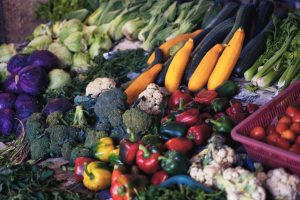God had a great plan when he created the world and created us. It is incredible to how everything that He created works together in harmony. One example of this is how food that is in-season supports our bodies with what they need during that season. Although we are not saying that you should completely avoid foods that are out of season (even those foods can have great health benefits), it can be helpful to increase focus on foods that are in-season.
How You Benefit from Eating Seasonal Food
Supporting Seasonal Health Needs.

The food that you eat in each season can make a big impact on your health. Mother nature has done a great job in coordinating food to grow during each season that also meets our needs during that season. For example, in the summer we typically increase our activity and sweat more. This increases our need for hydration. Summer is when we see in-season produce that is high in water content: watermelon, berries, tomatoes, cucumbers.
On the other hand, squash is abundant in the fall and winter and has nutrients that support winter-related health. For example, squash is high in Vitamin A, which supports the immune system and is crucial for eye health and low-light vision (just in time for those dark months!) It’s also high in many of the B Vitamins, which are important to metabolism and energy production (anyone else tend to notice a decline in energy during winter?).
More nutrient-dense produce.
Produce loses nutrients and antioxidants after being harvested. The longer it’s been since harvest, the more nutrients that are lost. Eating in-season (and especially eating local, in-season) helps to ensure that produce has spent minimal time in transit or on the shelf, and therefore has retained more of the micronutrients your body needs to thrive. This is huge when we take into consideration that some experts say that the average vegetable in the grocery store has up to 40% less minerals than 50 years ago. A bonus for fresher, in-season food: foods that are fresh tend to have more flavor!
Keeps your diet diverse.
We’ve all done it: eaten the same handful of foods over and over (even if they were prepared in different ways.) Eating seasonally encourages us to switch up what we are eating every few months. This helps to maintain a healthy balance of the microbiota in our gut. A balanced gut is immensely important for overall health and wellness.
Save money and support your community.

Produce that is in-season costs less to grow, harvest, and transport, and therefore naturally costs less to buy. A great way to save money and get local, fresh, seasonal food is to opt into a CSA (Community Supported Agriculture) box. This also supports your local farmers, which has an overall beneficial effect on your local economy. Usually, connecting with local farmers is also easier than connecting with big, generic brands. This is beneficially, as you can also form a relationship with the farmers and ask questions to learn more about where your food is coming from.
Supporting the environment.
Seasonal food is more likely to be produced and harvested closer-to-home, which means fewer resources are used for long-distance transport. Produce that is grown in-season also requires less work to grow, as it’s support naturally by the weather. This means fewer pesticides, waxes, and preservatives and less genetic modification for conventionally-grown produce.
Now that you know some of the benefits of eating seasonally, here are two of our favorite guides to in-season produce in Minnesota:





